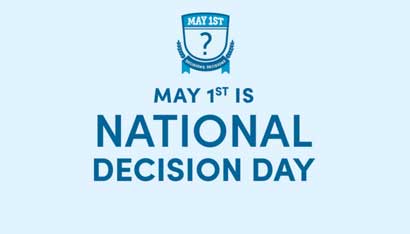National College Decision Day is May 1st. You should check your financial aid award before making a decision. Remember that community colleges operate on a rolling admissions schedule. Before making your final decision, take time to celebrate your accomplishments and keep your eyes on the future. Show the colleges why it’s smart to accept you. Ultimately, you’ll have to decide between attending school where you have a good chance of getting in and wasting your time and money.
May 1st is National College Decision Day

National College Decision Day has long been the first day of summer before the start of the school year. As summer approaches, you might be trying to decide what colleges to apply to. By planning ahead, you can review your options and make an informed decision on which college to attend. As early as possible, submit information and deposits. As soon as May 1 rolls around, you must submit all required documents and pay any deposit. There are many ways to prepare for National College Decision Day.
Community colleges operate on rolling admission
A rolling admission schedule makes it easier to get into a college that fits your needs. While a school that has no set deadlines for applications may seem like a great idea, you need to remember that applying late can have negative consequences. You could miss out on deadlines for honors programs, scholarships, and financial aid, browse around this post.
Students should check their financial aid award
When choosing a college, it’s important to compare your financial aid award with the costs of attending each school. You can do this by looking at the award letter side-by-side with the cost of attendance at each college. Make sure to look at the total cost of attendance at each school and see if the award letter includes any student loans. Be sure to look at the estimated cost of attendance as well, as this is what the college will use to determine your financial need.
Rejecting schools that don’t meet their expectations
When you’re making your college choice, rejecting schools that don’t meet your expectations can be an easy but crucial step. Schools want to send their students to good jobs and therefore the quality of their performance will reflect on them. Insufficient experience is a common reason for rejecting schools, but there are other reasons as well.
Researching Colleges

Whether you’re a first-year student or an experienced adult, research is crucial to making the right college choice. It will help you develop your college list, prepare for interviews, and write essays. Once you’ve completed your research, you can weed out the schools that don’t meet your needs and leave yourself with a list of 10 to 15 “number one” schools. There are many resources available to help you with college research, including IvyWise. They can help you understand what each school requires, including SAT or ACT scores, high school GPAs, and extracurricular activities.
Conclusion:
When you are deciding on a college, make sure to consider your priorities. You should consider factors such as what your degree track will entail, your extracurricular activities, and whether or not you will receive financial aid. If you have options, you should pick a backup college as well. If you are unsure about your final decision, make a backup list of the pros and cons. After you’ve made your list, make a final decision. Then, set a deadline to make the final decision.